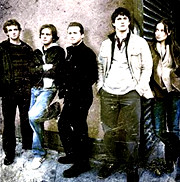After visiting Career Distinction and running its Online Identity Calculator on Tom Cruise yesterday (check the comments on the post), we started to wonder what would happen if we plugged in more people, ranging from notable bloggers to CEO bloggers to CEOs with no direct social media presence.
The mix is pretty eclectic, but it provides some interesting results. Keep in mind that our formula is less than scientific: we used the calculator (beta) to establish whether these individuals have an online identity that matches up with what seems to be their desired personal brand. Since the calculator only offers generalized definitions, we summed up the first three pages of a Google search.
Seth Godin — Digitally Distinct, 10
Desired: A bestselling author, entrepreneur, and agent of change.
Online: A leading marketing author and popular business blogger.
We picked Godin mostly because we had a hunch he would set the high water mark and, no surprise, he did. While there seems to be some slight variation between his desired and online brand, it’s only because the Godin brand overshadows the company he founded, Squiddo. In sum, his brand trends toward top online marketing expert/author (rather than entrepreneur and agent of change) and there is nothing wrong with that.
Johnathan Swartz — Digitally Distinct, 10
Desired: An approachable, likeable, creative, and unconventional CEO.
Actual: An approachable, likeable, creative, and unconventional CEO.
Swartz is the top CEO blogger for a reason. There is virtually no distinction between his online identity and his desired brand — he always presents compelling non-techno babble information to help businesses understand that technological advancements mean market opportunities as opposed to business threats. He does a near perfect job setting the cultural tone of Sun Microsystems and his views mirror what we’ve said for two years.
Jeffrey Immelt — Digitally Distinct, 9
Desired: A hardworking strategist who helped turn General Electric around.
Actual: A relentless workaholic whose biggest hope is everyone else can keep up.
Given Immelt devotes 12 weeks to foreign travel as one of our nation’s leading advocates for globalization, we’re not surprised he doesn’t have time to establish a direct social media presence. Still, as a Fortune 500 company CEO (top 10), others present who he is fairly well, with one small caveat — as much as he is admired, skeptics water down his ideas (despite results), leading us to believe he could score a 10 with a direct presence on the Internet.
Alan Meckler — Digitally Distinct, 9
Desired: A serious business executive and aggressive online CEO.
Actual: A straightforward executive who calls it like he sees it.
As one of the top 10 ten CEO bloggers, we’re not to surprised to see Meckler also scores near the top. There are some identity discrepancies, primarily because his writing and interview style come across as a tough-as-nails CEO when he’s much more approachable than that. Also, his view of Jupiterimages is obviously a bit biased when compared to his view of competitors, but we wouldn’t expect otherwise.
Scott Baradell — Digitally Distinct, 9
Desired: Accomplished brand strategist with corporate communications and journalism experience.
Actual: Journalist turned public relations strategist, which might explain why he never takes the industry too seriously.
With Baradell’s emphasis on public relations, media analysis, and blog entertainment, his online identity tends to shift away from brand strategist. But where his online personality works is that he is unquestionably adept at keeping things interesting. For evidence: check Media Orchard’s R Rating and his anagram post plug of Occam’s RazR among others.
Geoff Livingston — Digitally Distinct, 9
• Desired: A leading marketing expert and top-ranked marketing blogger/author.
• Actual: A seasoned marketing pro, social media analyst, and blogging guru.
For the most part, Livingston has achieved his desired online identity, especially since he has already been recognized as an area marketing blog guru by The Washington Post. Without question, he has some great posts that often cross over into legitimate trade journalism. With a book set for release and several post serials worth reading, he’s coming close to the tipping point. If there is one area to improve, it’s remembering that too much focus on others won’t brand you as a leader.
The Recruiting Animal — Digitally Distinct. 8 (7)
• Desired: The most outrageous and entertaining recruiting blogger and online radio host in history.
• Actual: The most outrageous and entertaining recruiting blogger and online radio host in history.
There is little doubt that The Recruiting Animal has achieved his online identity. He is a classic example of being positively infamous, with his stage name often appearing where you least expect it (even in places his peers might have missed). What’s equally interesting to me is that if we plug in The Recruiting Animal’s real name, his score drops to Digitally Dabbling, but all of the information about him remains on target (just slightly more serious).
Les Moonves — Digitally Disastrous, 8
Desired: A seasoned old school programmer who became CEO of a leading mass media company.
Actual: A CEO with a dated programming vision who calls the shots with little explanation.
Given our coverage of the Jericho cancellation protest (and reinstatement), we noticed that Moonves tends to leave people completely confused. On one hand, he wants CBS to lead the digital charge, but then doesn’t give new media much credit. He dumped Imus and dumbed down CBS News despite what ratings say, yet argued that the original cancellation of Jericho was based only on ratings. Given he has no direct social media presence, his brand is shaped almost entirely by mixed messages that paint him up as a CEO who likes to say “because I said so.”
David Neeleman — Digitally Disastrous, 8
Desired: A relentless innovator who challenged the airline industry to do better.
Actual: An ousted CEO trying to prove his relevance after a company crisis.
I read Neeleman’s blog because I admire what he has accomplished. Some people don’t get this in our coverage of the JetBlue crisis. They won’t get it here either as we’ve noticed a dramatic personal brand shift since his departure as CEO of JetBlue. He insists he is comfortable with the change despite several interviews that suggest otherwise. It doesn’t help that "Montgomery Burns" has taken over his flight log. It’s supposed to be funny, but only it reinforces questionable choices in the face of crisis.
Jason Goldberg — Digitally Disastrous, 7
• Desired: A successful entrepreneur who is leading innovator of the online recruiting community.
• Actual: A young, brash executive who gets caught up in online controversies and spins like there is no tomorrow.
There’s a boatload of information on the Web about Goldberg. Unfortunately, most of it doesn’t seem to have any relevance to what he wants to express about himself or his company. Most of it is about blog controversies, blatant spin, and a sometimes questionable management style. Other times, however, Goldberg even departs from this identity too, which makes people wonder how seriously they should take him. The odd attack-feint retreat-attack-retreat tactic doesn’t help.
Amanda Chapel — Digitally Disastrous, 7
• Desired: A mysterious and provocative foil for the online public relations community.
• Actual: A collective of anonymous writers who believe all publicity is good publicity.
There is a lot of information about the collective Chapel on the Web, but more and more of it has little relevance to what they want to express about themselves. As time goes on, it will be nearly impossible to remove all the irrelevant information. Some people have asked about my interest in Chapel, since they come up on my blog every now and again. Truth be told, I’m more interested in why Steve Rubel, Mark Ragan, and even Shel Holtz continue to feed the Chapel credibility. Is the public relations industry that boring or afraid to debate that it needs an anonymous ghost to do it for them?
Add it up and all of this seems to reinforce the most basic premise of my Fragile Brand Theory. You see, in almost every case listed above, without exception, the closer their personal and online brands are to the reality of who they are, the greater their measure of success in maintaining that brand. It also demonstrates, in a couple of instances, how one handles crisis or controversy can also enhance or erode brand credibility almost overnight.
In closing, just to be fair, we ran my identity too. While there is some discrepancy depending on how you type in my name, I came out with a Digitally Distinct 8 and Copywrite, Ink. with a Digitally Distinct 9. This stands to reason: establishing an online identity for the company ahead of me is by design.
The mix is pretty eclectic, but it provides some interesting results. Keep in mind that our formula is less than scientific: we used the calculator (beta) to establish whether these individuals have an online identity that matches up with what seems to be their desired personal brand. Since the calculator only offers generalized definitions, we summed up the first three pages of a Google search.
Seth Godin — Digitally Distinct, 10
Desired: A bestselling author, entrepreneur, and agent of change.
Online: A leading marketing author and popular business blogger.
We picked Godin mostly because we had a hunch he would set the high water mark and, no surprise, he did. While there seems to be some slight variation between his desired and online brand, it’s only because the Godin brand overshadows the company he founded, Squiddo. In sum, his brand trends toward top online marketing expert/author (rather than entrepreneur and agent of change) and there is nothing wrong with that.
Johnathan Swartz — Digitally Distinct, 10
Desired: An approachable, likeable, creative, and unconventional CEO.
Actual: An approachable, likeable, creative, and unconventional CEO.
Swartz is the top CEO blogger for a reason. There is virtually no distinction between his online identity and his desired brand — he always presents compelling non-techno babble information to help businesses understand that technological advancements mean market opportunities as opposed to business threats. He does a near perfect job setting the cultural tone of Sun Microsystems and his views mirror what we’ve said for two years.
Jeffrey Immelt — Digitally Distinct, 9
Desired: A hardworking strategist who helped turn General Electric around.
Actual: A relentless workaholic whose biggest hope is everyone else can keep up.
Given Immelt devotes 12 weeks to foreign travel as one of our nation’s leading advocates for globalization, we’re not surprised he doesn’t have time to establish a direct social media presence. Still, as a Fortune 500 company CEO (top 10), others present who he is fairly well, with one small caveat — as much as he is admired, skeptics water down his ideas (despite results), leading us to believe he could score a 10 with a direct presence on the Internet.
Alan Meckler — Digitally Distinct, 9
Desired: A serious business executive and aggressive online CEO.
Actual: A straightforward executive who calls it like he sees it.
As one of the top 10 ten CEO bloggers, we’re not to surprised to see Meckler also scores near the top. There are some identity discrepancies, primarily because his writing and interview style come across as a tough-as-nails CEO when he’s much more approachable than that. Also, his view of Jupiterimages is obviously a bit biased when compared to his view of competitors, but we wouldn’t expect otherwise.
Scott Baradell — Digitally Distinct, 9
Desired: Accomplished brand strategist with corporate communications and journalism experience.
Actual: Journalist turned public relations strategist, which might explain why he never takes the industry too seriously.
With Baradell’s emphasis on public relations, media analysis, and blog entertainment, his online identity tends to shift away from brand strategist. But where his online personality works is that he is unquestionably adept at keeping things interesting. For evidence: check Media Orchard’s R Rating and his anagram post plug of Occam’s RazR among others.
Geoff Livingston — Digitally Distinct, 9
• Desired: A leading marketing expert and top-ranked marketing blogger/author.
• Actual: A seasoned marketing pro, social media analyst, and blogging guru.
For the most part, Livingston has achieved his desired online identity, especially since he has already been recognized as an area marketing blog guru by The Washington Post. Without question, he has some great posts that often cross over into legitimate trade journalism. With a book set for release and several post serials worth reading, he’s coming close to the tipping point. If there is one area to improve, it’s remembering that too much focus on others won’t brand you as a leader.
The Recruiting Animal — Digitally Distinct. 8 (7)
• Desired: The most outrageous and entertaining recruiting blogger and online radio host in history.
• Actual: The most outrageous and entertaining recruiting blogger and online radio host in history.
There is little doubt that The Recruiting Animal has achieved his online identity. He is a classic example of being positively infamous, with his stage name often appearing where you least expect it (even in places his peers might have missed). What’s equally interesting to me is that if we plug in The Recruiting Animal’s real name, his score drops to Digitally Dabbling, but all of the information about him remains on target (just slightly more serious).
Les Moonves — Digitally Disastrous, 8
Desired: A seasoned old school programmer who became CEO of a leading mass media company.
Actual: A CEO with a dated programming vision who calls the shots with little explanation.
Given our coverage of the Jericho cancellation protest (and reinstatement), we noticed that Moonves tends to leave people completely confused. On one hand, he wants CBS to lead the digital charge, but then doesn’t give new media much credit. He dumped Imus and dumbed down CBS News despite what ratings say, yet argued that the original cancellation of Jericho was based only on ratings. Given he has no direct social media presence, his brand is shaped almost entirely by mixed messages that paint him up as a CEO who likes to say “because I said so.”
David Neeleman — Digitally Disastrous, 8
Desired: A relentless innovator who challenged the airline industry to do better.
Actual: An ousted CEO trying to prove his relevance after a company crisis.
I read Neeleman’s blog because I admire what he has accomplished. Some people don’t get this in our coverage of the JetBlue crisis. They won’t get it here either as we’ve noticed a dramatic personal brand shift since his departure as CEO of JetBlue. He insists he is comfortable with the change despite several interviews that suggest otherwise. It doesn’t help that "Montgomery Burns" has taken over his flight log. It’s supposed to be funny, but only it reinforces questionable choices in the face of crisis.
Jason Goldberg — Digitally Disastrous, 7
• Desired: A successful entrepreneur who is leading innovator of the online recruiting community.
• Actual: A young, brash executive who gets caught up in online controversies and spins like there is no tomorrow.
There’s a boatload of information on the Web about Goldberg. Unfortunately, most of it doesn’t seem to have any relevance to what he wants to express about himself or his company. Most of it is about blog controversies, blatant spin, and a sometimes questionable management style. Other times, however, Goldberg even departs from this identity too, which makes people wonder how seriously they should take him. The odd attack-feint retreat-attack-retreat tactic doesn’t help.
Amanda Chapel — Digitally Disastrous, 7
• Desired: A mysterious and provocative foil for the online public relations community.
• Actual: A collective of anonymous writers who believe all publicity is good publicity.
There is a lot of information about the collective Chapel on the Web, but more and more of it has little relevance to what they want to express about themselves. As time goes on, it will be nearly impossible to remove all the irrelevant information. Some people have asked about my interest in Chapel, since they come up on my blog every now and again. Truth be told, I’m more interested in why Steve Rubel, Mark Ragan, and even Shel Holtz continue to feed the Chapel credibility. Is the public relations industry that boring or afraid to debate that it needs an anonymous ghost to do it for them?
Add it up and all of this seems to reinforce the most basic premise of my Fragile Brand Theory. You see, in almost every case listed above, without exception, the closer their personal and online brands are to the reality of who they are, the greater their measure of success in maintaining that brand. It also demonstrates, in a couple of instances, how one handles crisis or controversy can also enhance or erode brand credibility almost overnight.
In closing, just to be fair, we ran my identity too. While there is some discrepancy depending on how you type in my name, I came out with a Digitally Distinct 8 and Copywrite, Ink. with a Digitally Distinct 9. This stands to reason: establishing an online identity for the company ahead of me is by design.

























